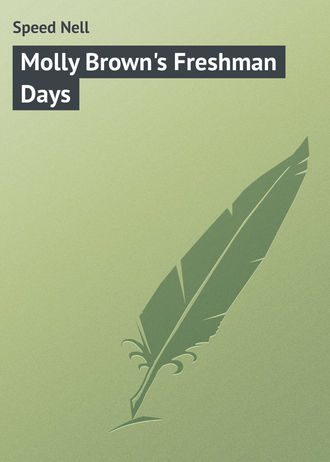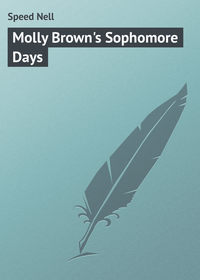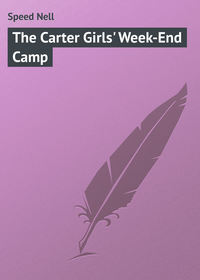 полная версия
полная версияMolly Brown's Freshman Days
“Well, you’d better settle it now, because here comes the President sailing up the walk. She’s going the rounds now, I suppose, and in another two minutes she’ll be springing the question on us.”
Judy, who was sitting at the front window of her own room, nodded down into the yard and smiled politely, and the girls had just time to settle among themselves what they were going to say when there was a smart rap on the door and President Wakefield entered.
She wore rather masculine-looking clothes, and carried a business-like small-sized suit case in one hand and a notebook in the other.
“Hello, girls!” she began; “I’m so glad I caught you together. It saves telling over the same thing three times. I want to know first exactly how you stand on the woman’s suffrage question. Now, don’t be afraid to be frank about it, and speak your minds. Of course, I’m sure that, being women who are seeking the higher education, you are all of you on the right side – the side of the thinking woman of to-day – ”
Here Judy sneezed so violently that she almost upset the little three-legged clover-leaf tea table at her elbow.
“How do you feel on the subject, Molly?”
Molly smiled broadly, while Nance cleared her throat and Judy blew her nose and exclaimed:
“I think I must be taking cold. Excuse me while I get a sweater,” and disappeared in the closet.
“I – I’m afraid I don’t know very much about the subject, Margaret. You see, I was brought up in the country, and I haven’t had a chance to go into woman’s suffrage very deeply.”
“There is no time like the present for beginning, then,” said Margaret promptly, opening the business-like little suit case. “Read these two pamphlets and you’ll get the gist of the entire subject clearly and concisely expressed. I will call on you for an opinion next week after you’ve had time to study the question a bit.”
Molly took the pamphlets and began hastily turning the leaves. She wanted to laugh, but she felt certain it would offend Margaret deeply not to be taken seriously, and she controlled her facial muscles with an effort while she waited for attack No. Two.
“Nance, have you taken any interest in this question?” continued Margaret, who seemed to have the patience of a fanatic spreading his belief.
“I know something about it,” replied Nance quietly. “You see, my mother is President of a Woman’s Suffrage Association, and she spends most of her time going about the country making speeches for the National Association.”
“What, is your mother Mrs. Anna Oldham, the famous clubwoman?” cried Margaret.
Nance nodded her head silently.
“Why, she is one of the greatest authorities on women’s suffrage in the country!” exclaimed Margaret with great enthusiasm. “It says so here. Look, it gives a little sketch of her life and titles. She is president of two big societies and an officer in five others. It’s all in this little book called ‘Famous Club Women in America and England.’ Dear me,” continued Margaret modestly, “I think I’d better resign and give the chair to you, Nance. I’m nobody to be preaching to you when you must know the subject from beginning to end.”
Nance smiled in her curious, whimsical way.
“Have you ever eaten too much of something, Margaret,” she said, “and then hated it ever afterward?”
“Why, yes,” replied the President, “that has happened to every one, I suppose. Mince pie and I have been strangers to each other for many years on that account.”
“Well,” continued Nance, “I’ve been fed on clubs until I feel like a Strausberg goose. I’ve had them crammed down my throat since I was five years old. When I was twelve, I was my mother’s secretary, and I’ve sent off thousands of just such pamphlets as you are distributing now. I learned to write on the typewriter so I could copy my mother’s speeches. I’ve been usher at club conventions and page at committee meetings. I’ve distributed hundreds of badges with ‘Votes for Women’ printed on them. I had to make a hundred copies of mother’s speech on ‘The Constitution and By-Laws of the United States,’ and send them to a hundred different women’s clubs. So, you see,” she added, simply, frowning to keep back her tears, “I think I’ll take a rest from clubs while I’m at college and begin to enjoy life a little with Molly and Judy.”
Margaret Wakefield, who was really a very nice girl and exceedingly well-bred, leaned over and placed a firm, rather large hand on Nance’s.
“I should think you had had enough,” she exclaimed, giving the hand a warm squeeze. Seeing teardrops glistening in Nance’s eyes, she rose and started to the door. “If ever you do want to come to any of the meetings, you will be very welcome, girls,” she said; “but you don’t want to overdo anything in life, you know, and if there are things that interest you more than Woman’s Suffrage you oughtn’t to sacrifice yourselves. People should follow their own bent, I think. Good-bye,” she went on, smiling brightly, “and don’t bother to read the pamphlets, Molly, dear, if you don’t want to. It’s a poor way to carry a point to make a bugbear of the subject.”
She went out quietly and closed the door.
“I call her a perfect lady,” exclaimed Molly, trying not to look at Nance, but wishing at the same time that her friend would give way just once and have a good cry.
“Let’s cut study this afternoon and take a walk,” exclaimed Judy. “Trot along and get on your sweaters. It’s much too glorious to stay indoors. Nance, can’t you do your theme after supper? Molly, you look a little peaked. It will do you good to breathe the fresh, untainted air of the pine woods.”
Judy, it must be confessed, was always glad of a good excuse to get away from her books.
“Splendid!” cried Molly with enthusiasm.
“And I’ll bring my English tea basket,” went on Judy. “Who’s got any cookies?”
“I have,” said Nance, now fully recovered.
In five minutes the three girls had started across the campus to the road and presently were making for the pine woods that bordered the pretty lake. Everybody seemed to be out roaming the country that beautiful autumn afternoon. Parties of girls came swinging past, who had been on long tramps through the woods and over to the distant hills which formed a blue and misty background to the lovely rolling country. The lake was dotted with canoes and rowboats, and from far down the road that wound its way through the valley there came the sound of singing. Presently a wagon-load of girls emerged into view, followed by another wagon filled with autumn leaves and evergreens.
“It’s the sophomore committee on decoration,” Judy explained. Apparently she knew everything that happened at college. “They are getting the decorations for the gym. for the ball to-morrow night.”
Molly quickly changed the subject. She had had two invitations to go to the Sophomore-Freshman Ball since she had accepted Frances Andrews’ offer, and several of the sophomores had been to see her to ask her to change her mind, but, having given her word, Molly intended to keep it, no matter what was to pay.
“Let’s go to the upper end of the lake,” she suggested. “It’s wilder and much prettier,” and she led the way briskly along the path through the pine woods.
In a little while they came out at the other end of the small body of water where the woods abruptly ended at the foot of a hill called “Round Head,” which the girls proceeded to climb. From this eminence could be seen a widespreading panorama of hills and valleys, little streams and bits of forests, and beyond the pine woods the college itself, its campus spread at its feet like a mat of emerald green.
The girls paused breathlessly and Judy put down her tea basket.
“Here’s where a little refreshment might be very welcome,” she said, opening her basket of which she was justly proud, for not many girls at Wellington could boast of such a possession. She filled the little kettle from the bottle of water she had taken the precaution to bring along, and they sat down in a circle on the turf. The autumn had been a dry one, and the ground was not damp. Nibbling cookies and sweet chocolate, they waited for the water to boil.
“Look, here comes some one,” whispered Judy, indicating the figure of a man appearing around the side of the hill.
“I do hope it’s not a tramp,” exclaimed Nance uneasily.
Molly Brown hoped so, too, although she said nothing. But she felt nervous, as who wouldn’t in that lonely place? As the man came nearer, it became plain that he was making straight for them, and he did most assuredly look like a wanderer of some kind. He was dressed in an old suit of rough gray, wore an old felt hat and carried a staff like a pilgrim. The girls sat quite still and said nothing. There had been a silent understanding among them that it was better not to run. As the man drew nearer, Molly became suddenly conscious of the fact that across the gray trousers just above the knees was a deep coffee-colored stain.
The next moment the man stood before them, leaning on his staff, his hat under his arm. It was “Epiménides Antinous Green.”
“Confess now,” he said, smiling at all of them and looking at Molly, whom he knew best of the three, “you took me for a tramp?”
“Not exactly for a tramp,” answered Molly; “but for one who tramps.”
“What’s the difference, Miss Brown?” he asked laughing.
“Oh, everything. Clothes – ” she paused, blushing deeply. Her eyes had fallen on the coffee stain. “Why doesn’t he have it cleaned off?” she thought, frowning slightly. “And – and looks,” she continued out loud.
“Even in the walk,” Judy finished. “Perhaps we can give you a cup of tea, Professor,” she added politely.
The Professor was only too glad for a cup of tea. He had been roaming the hills all day, he said, and he was tired and thirsty. While he sipped the fragrant beverage, he glanced at his watch.
“The truth is, I had an appointment at this spot at four-thirty,” he announced. “I was to meet my young brother George, familiarly known as ‘Dodo.’ He’s at Exmoor College, ten miles over, and was to walk across the valley to the rendezvous, and I was to conduct him safely to my rooms for supper. He was afraid to enter the college by the front gate for fear of meeting several hundreds of young women. He runs like a scared rabbit if he sees a girl a block off.”
“Won’t it give him an awful shock when he catches a glimpse of us waiting here on the hilltop?” asked Molly.
“It’s a shock that won’t hurt him,” replied the professor. “We’ll see what happens, at any rate.”
He put his cup and saucer on the ground, while his quizzical eyes, which seemed to laugh even when his face was serious, turned toward Molly. And Molly was well worth looking at that afternoon, although she herself was much dissatisfied with her appearance. Her auburn hair had almost slipped down her back. Her blue linen shirtwaist was decidedly blousey at the waist line. “It’s because I haven’t enough shape to keep it down,” she was wont to complain. Her cheeks were glowing and her eyes as calmly blue as the summer skies.
“Perhaps we’d better start on,” said Nance uneasily. She always felt an inexplicable shyness in the presence of men, and her friends had been known to nickname her “old maid.”
But before Professor Green could protest that he was only too glad to have his bashful brother make the acquaintance of three charming college girls, Judy, ever on the alert, exclaimed, “Look, there he comes around the side of the hill.”
The Professor rose and signaled with his hat, chuckling to himself, as he watched his youthful brother pause irresolutely on the hillside.
“Come on, Dodo,” he shouted, making a trumpet of his hands.
“I believe not this afternoon, thank you,” Dodo trumpeted back. “I have an important engagement at six.”
The girls could not keep from laughing.
“It’s a shame to frighten the poor soul like that,” exclaimed Molly. “We’ll start back, Professor, and leave him in peace.”
But the Professor was a man of determination, and had made up his mind to bring his shy brother into the presence of ladies that afternoon, very attractive ladies at that, of George’s own age, with simple, unaffected manners, calculated to make a shy young man forget for the moment that he had an affliction of agonizing diffidence.
“George,” called the professor, running a little way down the hillside, “come back and don’t be a fool.”
The wretched lad turned his scarlet face in their direction and began to climb the hill. He was a tall, overgrown youth, with large hands and feet, and when he stood in their midst, holding his cap nervously in both hands, while the Professor performed the introductions, he looked like a soldier facing the battle.
It remained for Molly and Judy to put him at his ease, however, with tea and cookies and questions about Exmoor College, while the Professor conversed with Nance about life at Wellington, and which study she liked best. At last the spirit of George emerged from its shy retreat, and he forgot to feel self-conscious or afraid. They rose, packed the tea things and started back. And it was the Professor who carried Judy’s tea basket, while George, glancing from Molly’s blue eyes to Judy’s soft gray ones, strolled between them and related a thrilling tale of college hazing.
“That was a swift remedy, was it not, Miss Oldham?” observed the Professor, laughing under his breath.
But undoubtedly the cure was complete, for that very evening Molly received a note, written in a crabbed boyish hand, and signed “George Green,” inviting the three girls to ride over to Exmoor on the trolley the following Saturday and spend the day. Miss Green, an older sister, would act as chaperone.
And not a few thrills did these young ladies experience at the prospect.
CHAPTER IX
RUMORS AND MYSTERIES
How many warm-hearted, impetuous people get themselves into holes because of those two qualities which are very closely allied indeed; and Molly Brown was one of those people. Carried away by emotions of generosity, she found herself constantly going farther than she realized at the moment. Why, for instance, could she not have put Frances Andrews off with an excuse for a day or so? Some one would surely have asked her to the Sophomore-Freshman ball.
And if she had only liked Frances, matters would have been different. If it had been an act of friendship, of deep devotion. But in spite of herself, she could not bring herself to trust that strange girl, beautiful and clever as she undoubtedly was, and sorry as Molly was for her. After all, it was rather selfish of Frances to have obtained the promise from Molly. Did she think it would reinstate her in the affections of her class to be seen in the company of the popular young freshman?
All this time, Molly said nothing to her friends, but on the morning of the ball she could not conceal from Judy and Nance her apprehension and general depression. And seeing their friend’s lack-lustre eye and drooping countenance, they held a counsel of war in Judy’s small bedroom.
At the end of this whispered conference, Judy was heard to remark:
“I’m afraid of the girl, to tell you the truth. Her fiery eyes and her two-pronged tongue seem to take all the spirit out of me.”
“I’m not afraid of her,” said Nance, who had a two-pronged tongue of her own, once she was stirred into action. “You wait here for me, and when I come back, you can go and notify the sophomores of what’s happened. Of course, Molly will get to the ball all right. The thing is to extricate her from the situation by the most tactful and surest means.”
Judy laughed.
“No,” she answered, “the thing is not to let Molly know we have saved her life.”
“If Frances hadn’t done that witch’s stunt and said all those malicious things at Molly’s Kentucky spread, I don’t think I should have minded so much. And do you know, Judy, that the report has spread abroad that she and Molly had prepared the whole thing beforehand, speeches and all and were in league together? You see, Molly was the only one who wasn’t hit.”
“You don’t mean it,” cried Judy. “Then, more than ever, I want to spare the child the humiliation she might have to suffer if she went with Frances to-night. Go forth to battle, Nance, and may the saints preserve you.”
Nance girded her sweater about her like a coat of mail, stiffened her backbone, pressed her lips together and marched out to the fray. She never told even Judy exactly what took place between Frances and her in that small room, with its bewildering array of fine trappings, silver combs and brushes, yellow silk curtains at the window, Turkish rugs, books and pictures. No one had ever seen the room except Molly the night of the spread, when it was too dark to make out what was in it.
There was no loud talking. Whatever was said was of the tense quiet kind, and presently Nance emerged unscathed from the encounter.
“She made me give my word of honor not to tell what was said,” she announced to the palpitating Judy, “but she’s writing the note to Molly now; so go quickly and inform someone that Molly has no escort for the ball.”
Judy departed much mystified and Nance remained discreetly away from her own room until she perceived Frances steal down the hall, push a note under their door and then hurry back, bang her own door and lock it.
Then, after a moment’s grace, Nance marched boldly to their chamber. Molly was reading the note.
“What do you think, Nance?” she exclaimed with a tone of evident relief in her voice, “Frances Andrews can’t go to-night.”
“Indeed, and what reason does she give?” asked Nance, feeling very much like a conspirator now that she was obliged to face Molly.
“None. She simply says ‘I’m sorry I can’t go to-night. Hope you’ll enjoy it. F. A.’ How does she expect me to get there, I wonder, at the eleventh hour?”
Nance examined her finger nails attentively.
“Perhaps she’s seen to that,” she replied after a pause.
“Nance,” said Molly, presently, “I’m so relieved that I think I’ll have to ’fess up. It’s mean of me, I know, and I feel awfully ungenerous to be so glad. You see, nobody can ever tell what strange, freakish thing she’s going to do. Of course she was the witch. I knew it from the conscious look that came into her face when I told her about it afterwards.”
“The mistake she has made is being defiant instead of repentant,” said Nance. “Instead of trying to brazen it out, she ought to ‘walk softly,’ as the Bible says, and keep quiet. She is the most embittered soul I ever met in all my life. If hatred counted for much, her hatred for her own class would burn it to a cinder.”
There was a sound of hurrying footsteps on the stairs and Judy burst into the room. Her face was aflame and she flung herself into a chair panting for breath.
“What’s your hurry?” asked Molly, slipping on her jacket. “Excuse me, I must be chasing along to French. Tell her the news, Nance.”
No need to tell Judy news, who had news of her own.
“I tell you, Nance,” she exclaimed, “there are times when I think the position of a freshman is one of the lowliest things in life. The first sophomore I met was Judith Blount. I did feel a little timid, but I told her what had happened. ‘You can tell your friend,’ she said, ‘that we sophomores are not so gullible as all that, and if her nerve has failed her at the last moment, it’s her fault, not ours.’”
“Why, Judy,” exclaimed Nance, “you didn’t know you were jumping from the frying pan right into the fire when you told that to Judith Blount, who has never liked Molly from the beginning. It’s jealousy, pure and simple, I think; although there almost seems to be something more behind it sometimes. She takes such pains to be disagreeable. Was anyone else there to hear you?”
“Oh, yes. She was surrounded by her satellites, Jennie Wren and a few others.”
The two girls sat in gloomy silence for a few minutes. After that rebuff, they hardly cared to circulate the bit of news any further in the sophomore class, which, it must be confessed, had the reputation of being run by a clique of the most arrogant and snobbish set of girls Wellington College had ever known.
“Let’s go and tell our woes to nice old Sally Marks,” suggested Judy, and off they marched in search of the good-natured funny Sally, whose room was on the floor below.
“Come in,” she called at their tap on the door, and noticing at once their serious faces, she exclaimed:
“I declare, I am beginning to feel like the Oracle at Delphi. What’s the trouble, now, my children?”
“You ought never to have gone to Judith Blount,” she continued after they had unburdened their secrets. But having gone to her, “it would be well,” so spake the Oracle, “to sit back and hold tight. The news is certain to spread, and of course only Judith and her ring would believe that Molly sent you out to find her an escort. There is one thing sure: Molly is obliged to go to the dance, not only because she has so many friends, but because she figures, I am told, so largely in ‘Jokes & Croaks,’ and it would be sport spoiled if she wasn’t there when the things are read out. Now, trot along, children, I’m cramming for an exam., and I’m busier than the busiest person in Wellington to-day.”
The afternoon dragged itself slowly along. Nance took her best dress out of its wrappings, heated a little iron and smoothed out its wrinkles. She lifted Molly’s blue crepe from its hanger and laid it on the couch.
“It was made in the simplest possible way out of the least possible goods in the least possible time,” she informed Judy, who had wickedly cut a class and sat moping in her friend’s room. “Isn’t it pretty? We made it together, and I’m really quite puffed up about the result. It’s Empire, you know,” she added proudly.
The dress did indeed show the short Empire waist. The round neck was cut out and finished with a frill of creamy lace which Molly happened to have, and there had not been much of a struggle with the sleeves, which came only to the elbow and were to all intents and purposes shapeless. But the color was the thing, as Molly had said.
“I’d be willing to drown in a color like that,” Judy observed. Judy was quite a poseuse about colors and assured her friends that she could never wear red because it inflamed her temper and made her cross; that violet quieted her nerves; green stirred her ambitions, and blue aroused her sympathies. While they were looking at the dress, Margaret Wakefield and Jessie Lynch, her roommate and boon companion, after rapping on the door, sailed into the room.
“We came to consult about clothes,” they announced. “Is this to be an evening dress affair, or what’s proper to wear?”
“The best you have,” replied Judy, “at least that’s what I was told by the oracular Sally below stairs.”
“For the love of heaven, don’t tell that to Jessie,” cried Margaret. “If you give her so much rope, she’ll be wearing purple velvet and cloth of gold.”
Jessie laughed good-naturedly. She was already considered the best dressed and prettiest girl in the freshman class, and it was a joke at Queen’s Cottage that she had been obliged to apply to the matron for more closet room, because the large one she shared with Margaret Wakefield was not nearly adequate for her numerous frocks. It had been a constant wonder to the other girls in the house that these two opposite types could have become such intimate friends; but friends they were, and continued to be throughout their college course, although Jessie never could rake up an interest in the U. S. Constitution or woman’s suffrage, either.
The two girls really formed a sort of combination of brains and beauty, and it became generally known that Jessie would hardly have pulled through the four years, except for the indefatigable efforts of her faithful friend, Margaret.
Mabel Hinton, a Queen’s Cottage freshman, now popped her head in at the door, which was half open. She was a very odd character, but she was popular with her friends, who called her “The Martian,” probably because she had a phenomenal intellect and wore enormous glasses in tortoise shell frames which made her eyes look like a pair of full moons.
“I thought I heard a racket,” she said in her crisp, catchy voice. “I suppose you are all discussing the news.”
“News? What news?” they demanded.
She closed the door carefully and came farther into the room.
“Gather around me, girls,” she said mysteriously, enjoying their curiosity.









